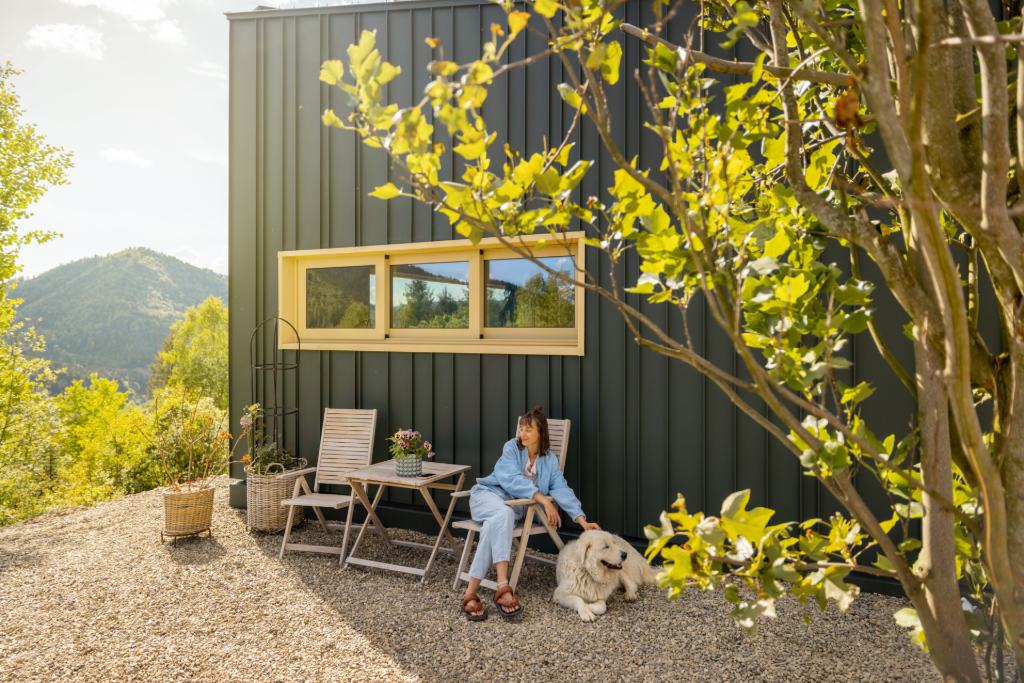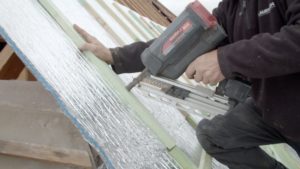How to Choose Insulation for Homes with Metal or Vinyl Siding

Homes with metal or vinyl siding are a popular choice for both commercial and residential buildings thanks to their durability, low maintenance, and modern aesthetic. However, selecting the right insulation for these structures requires special consideration. Metal and vinyl siding materials can create unique challenges like thermal bridging in metal siding or fluctuating temperatures in vinyl siding, impacting indoor comfort and energy efficiency.
So, what are the best insulation options and strategies for homes with metal or vinyl siding? Let Quattro help you make a choice that will enhance the performance, energy efficiency, and longevity of these buildings.
Insulation in Homes with Metal or Vinyl Siding
Insulation plays a large role in ensuring energy efficiency and comfort in homes with either metal or vinyl siding. Without the right insulation, metal siding can lead to significant heat transfer, resulting in higher heating and cooling costs. Vinyl siding, though a good insulator itself, often needs additional support to maintain stable indoor temperatures in extreme climates.
Insulation helps manage temperature fluctuations, reduce noise, and control moisture, preventing problems like mold, mildew, and condensation buildup. Proper insulation can prevent costly repairs, reduce energy bills, and ensure that the building meets sustainability standards.
Considerations When Choosing Insulation
Choosing insulation for buildings with metal or vinyl siding requires understanding the unique challenges these materials present. Here are some key factors to keep in mind:
- Climate Zone: The insulation requirements vary by climate. Colder climates typically need insulation with a higher R-value to retain heat, while warmer climates benefit from reflective insulation that prevents excessive heat gain.
- Thermal Bridging: Metal siding, in particular, can create thermal bridges where heat escapes through the structure. Opt for insulation types, like rigid foam or reflective vapor barriers, that effectively reduce thermal bridging to maintain energy efficiency.
- Moisture Control: Both metal and vinyl siding are susceptible to condensation. Moisture-resistant insulation, such as Quattro’s reflective vapor barrier insulation, helps prevent mold and mildew by managing condensation.
- R-Value Requirements: Ensure the chosen insulation meets or exceeds local building codes for R-value to maximize energy efficiency. Higher R-values are typically needed in colder climates, while moderate R-values suffice in milder regions.
Top Insulation Choices for Homes with Metal or Vinyl Siding
Selecting the right insulation material is key to addressing the unique challenges of metal and vinyl siding. Here are the best insulation options for maximizing performance in these buildings:
Rigid Foam Insulation
Rigid foam boards, such as extruded polystyrene (XPS) and polyisocyanurate, provide continuous insulation that effectively reduces thermal bridging. With an R-value of approximately R-5 to R-6 per inch, rigid foam boards offer both thermal resistance and moisture protection. This makes them an excellent choice for metal-sided homes, where minimizing heat transfer is crucial.
Reflective Vapor Barrier Insulation
Reflective vapor barrier insulation, like Quattro’s, is particularly effective for metal and vinyl siding. This type of insulation reflects radiant heat, helping to maintain stable temperatures inside the building. Quattro’s reflective vapor barrier insulation also prevents condensation by acting as a moisture barrier, protecting the building envelope from mold and mildew. This solution is especially beneficial in warm climates or buildings with high humidity levels.
Spray Foam Insulation
Closed-cell spray foam insulation offers high R-values (around R-6.5 per inch) and provides an effective air seal, reducing drafts and preventing air infiltration. Spray foam is ideal for difficult-to-reach areas and offers excellent moisture resistance, making it a good option for vinyl-sided homes in climates with varying temperatures. Spray foam is typically used in combination with other insulation types for complete coverage.
Mineral Wool Insulation
Mineral wool insulation is fire-resistant and provides excellent soundproofing, which can be beneficial in commercial settings or urban areas. Although it has a lower R-value than rigid foam (around R-4 per inch), mineral wool is moisture-resistant and allows vapor to escape, reducing the risk of mold growth. It can be used alongside other insulation types to improve thermal performance and acoustic control.
Quattro’s Solution to Insulation for Metal and Vinyl Siding
Quattro’s reflective vapor barrier insulation provides a versatile solution for homes with metal or vinyl siding. It reduces radiant heat transfer, preventing heat gain in warmer climates and maintaining a stable indoor temperature in cooler ones. The reflective layer acts as an additional moisture barrier, protecting the building envelope from condensation and potential mold growth.
This insulation also offers the added benefit of ease of installation, making it a time-efficient choice for commercial projects. With its durability and dual functionality in thermal resistance and moisture control, Quattro’s reflective vapor barrier insulation is an ideal option for maximizing performance in buildings with metal or vinyl siding. Contact us today to learn more about how Quattro’s insulation can improve your next project with metal or vinyl siding!


